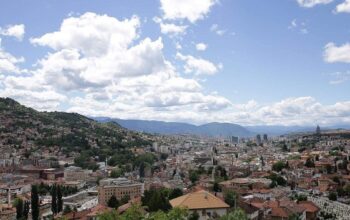After the BiH Constitutional Court’s November 2015 decision on the 9 January RS Day holiday, the RS National Assembly implemented the decision by adopting a new law, the Law on the Day of Republika Srpska, which made RS Day entirely voluntary and explicitly secular. Despite this, the new law is now itself being challenged by the Bosniak caucus before the BiH Constitutional Court.
RS Day, which marks the anniversary of Republika Srpska’s birth, is a celebration of Republika Srpska’s existence—an existence the Constitution of Bosnia and Herzegovina (BiH), Annex 4 of the Dayton Accords, fully acknowledges and embraces. Unfortunately, more than two decades after the Dayton Accords, to which Republika Srpska is a signatory, many Bosniak politicians still refuse to accept that existence.
In 2013, SDA President Bakir Izetbegovic filed a constitutionally groundless complaint against the RS Day Holiday in the BiH Constitutional Court. In November 2015, the Constitutional Court’s two Bosniak members—both of them former high SDA officials—joined with its three foreign members to outvote the court’s Serb and Croat members to uphold Izetbegovic’s complaint. The Court’s history of political influence and lack of independence in favor of the Bosniaks has been acknowledged by its own former foreign members and repeatedly criticized by international observers.
The decision held that inclusion of RS Day under the RS Law on Holidays privileges Serbs because the of the date’s connection with the Serb historical heritage and January 9’s status as the Day of St. Stefan, the Patron Saint of Republika Srpska in the Serbian Orthodox Church (notwithstanding the fact that religious holidays are the norm in BiH and throughout Europe). The decision emphasized that the Law on Holidays “imposes the celebration on all the inhabitants by introducing it as a day off, namely for them to refrain from work on that day . . . .”
The Constitutional Court’s November 2015 decision, however, did not forbid the RS from celebrating the date of its founding. It only required the RS to “harmonize Article 3(b) of the Law on Holidays of the Republika Srpska (Official Gazette of the Republika Srpska, no. 43/07) with the Constitution of Bosnia and Herzegovina.”
Despite disagreeing profoundly with the Constitutional Court majority’s view that this provision was constitutionally defective, the RS National Assembly in October 2016 passed a new law in accordance with the Constitutional Court’s decision. The new law replaced Article 3(b) of the Law on Holidays with a separate Law on Day of Republika Srpska. The new law makes explicit that the 9th of January is to be “celebrated as a secular holiday.” Moreover, the new law implements the Constitutional Court’s decision by making observation of RS Day absolutely voluntary; unlike the Law on Holidays, it contains not even a suggestion that places of work should close.
In response to the Constitutional Court’s November 2015 decision, members of the RS National Assembly also filed challenges in the Constitutional Court against the Federation’s “Independence Day” and “Statehood Day” holidays, which are not celebrated by Serbs. “Independence Day,” in particular, is deeply offensive to Serbs, who consider it to be the anniversary of an illegitimate referendum that tore BiH residents away from their country and triggered BiH’s terrible war. In July 2017, the Constitutional Court rejected those challenges, despite having upheld Izetbegovic’s similar complaint over RS Day. A series of decisions that permitted the two Federation holidays, while forbidding the closely analogous RS Day holiday, would violate prohibitions against ethnic discrimination in the BiH Constitution and international agreements to which BiH is a party.
Despite the fact that the RS’s 2016 Law on Day of Republika Srpska fully implements the Constitutional Court’s November 2015 decision, Bosniak members of the RS Council of Peoples have now challenged it before the BiH Constitutional Court. The new challenge confirms that SDA politicians’ objections to RS Day have never been about the day’s alleged unconstitutionality. Instead, the SDA wishes to outlaw the holiday marking Republika Srpska’s birth—even if it is wholly secular and voluntary—because they seek to delegitimize the very existence of Republika Srpska.
Republika Srpska was a party to the treaty that created the BiH Constitution, and the Constitution not only affirms Republika Srpska’s existence, but allocates most constitutional powers to Republika Srpska and the other constitutional Entity, the Federation. If the Constitutional Court were to uphold this new complaint, it would be an attack on Republika Srpska’s legitimacy and BiH’s constitutional order.


